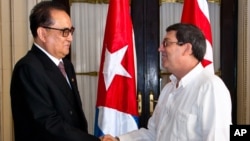The normalization of relations between the United States and Cuba is likely to further North Korea’s diplomatic isolation, experts say.
Recently, the United States and Cuba have agreed to re-establish diplomatic ties and permanent diplomatic missions in their respective countries on July 20, ending hostilities of more than a half-century.
Analysts in Seoul say the diplomatic move between the United States and Cuba could affect relations between South Korea and Cuba. The two countries have not established formal diplomatic ties, but relations between the two sides have improved recently. Trade volume between the countries reached $57 million last year.
On Thursday, the South welcomed the normalization of ties between the United States and Cuba and said it hoped to improve ties with Havana.
“The government of the Republic of Korea welcomes the agreement the U.S. and Cuba have reached to re-establish their diplomatic relations and reopen embassies in their respective countries,” the South’s Ministry of Foreign Affairs said in a statement.
Noh Kwang-il, spokesman for the ministry, said the government “will strengthen cooperation with Cuba in the areas of trade, culture and health, and continue to improve ROK-Cuba bilateral ties.”
Nam Gwang-gyu, a professor at Seoul-based Korea University, said the normalization of relations between the South and Cuba would be a significant diplomatic blow and "quite an ideological eye-opener" to the North, Cuba’s longtime ally.
Despite the pressure of isolation, some are skeptical the North will change course.
“North Korea is not likely to embrace change. Instead, it will likely further its existing dual policy of pursuing nuclear weapons and economic development while keeping its self-reliance approach,” said Yang Moo-jin, a professor at the University of North Korean Studies in Seoul.
In an apparent response to the development in U.S.-Cuba ties, the North dispatched senior officials to Cuba. Last week, Kang Sok Ju, a member of the North’s Political Bureau and secretary of the Workers' Party Central Committee, traveled to Cuba and met with Cuban President Raul Castro. In March, the North’s foreign minister, Ri Su Yong, visited the country and met with his Cuban counterpart. Prensa Latina, Cuba’s state-run news media, said the two diplomats stressed the “excellent relations” between the two countries.
North Korea and Cuba have maintained diplomatic ties since 1960. Fidel Castro visited the North in 1986 and met with Kim Il Sung, the late North Korean leader.
Jee Abbey Lee contributed to this report.




